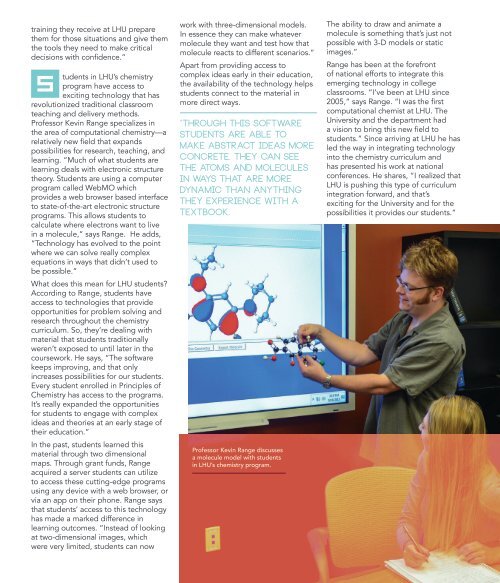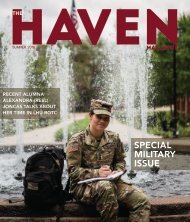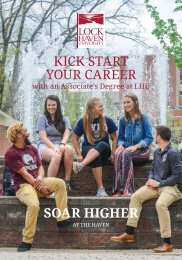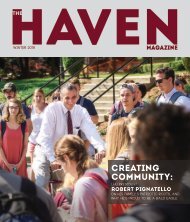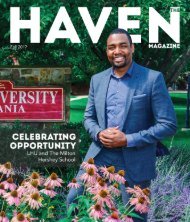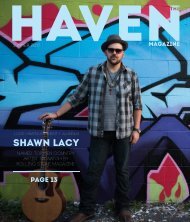The Haven Magazine Spring 2018
Create successful ePaper yourself
Turn your PDF publications into a flip-book with our unique Google optimized e-Paper software.
training they receive at LHU prepare<br />
them for those situations and give them<br />
the tools they need to make critical<br />
decisions with confidence.”<br />
students in LHU’s chemistry<br />
program have access to<br />
exciting technology that has<br />
revolutionized traditional classroom<br />
teaching and delivery methods.<br />
Professor Kevin Range specializes in<br />
the area of computational chemistry—a<br />
relatively new field that expands<br />
possibilities for research, teaching, and<br />
learning. “Much of what students are<br />
learning deals with electronic structure<br />
theory. Students are using a computer<br />
program called WebMO which<br />
provides a web browser based interface<br />
to state-of-the-art electronic structure<br />
programs. This allows students to<br />
calculate where electrons want to live<br />
in a molecule,” says Range. He adds,<br />
“Technology has evolved to the point<br />
where we can solve really complex<br />
equations in ways that didn’t used to<br />
be possible.”<br />
What does this mean for LHU students?<br />
According to Range, students have<br />
access to technologies that provide<br />
opportunities for problem solving and<br />
research throughout the chemistry<br />
curriculum. So, they’re dealing with<br />
material that students traditionally<br />
weren’t exposed to until later in the<br />
coursework. He says, “<strong>The</strong> software<br />
keeps improving, and that only<br />
increases possibilities for our students.<br />
Every student enrolled in Principles of<br />
Chemistry has access to the programs.<br />
It’s really expanded the opportunities<br />
for students to engage with complex<br />
ideas and theories at an early stage of<br />
their education.”<br />
In the past, students learned this<br />
material through two dimensional<br />
maps. Through grant funds, Range<br />
acquired a server students can utilize<br />
to access these cutting-edge programs<br />
using any device with a web browser, or<br />
via an app on their phone. Range says<br />
that students’ access to this technology<br />
has made a marked difference in<br />
learning outcomes. “Instead of looking<br />
at two-dimensional images, which<br />
were very limited, students can now<br />
work with three-dimensional models.<br />
In essence they can make whatever<br />
molecule they want and test how that<br />
molecule reacts to different scenarios.”<br />
Apart from providing access to<br />
complex ideas early in their education,<br />
the availability of the technology helps<br />
students connect to the material in<br />
more direct ways.<br />
“Through this software<br />
students are able to<br />
make abstract ideas more<br />
concrete. <strong>The</strong>y can see<br />
the atoms and molecules<br />
in ways that are more<br />
dynamic than anything<br />
they experience with a<br />
textbook.<br />
Professor Kevin Range discusses<br />
a molecule model with students<br />
in LHU’s chemistry program.<br />
<strong>The</strong> ability to draw and animate a<br />
molecule is something that’s just not<br />
possible with 3-D models or static<br />
images.”<br />
Range has been at the forefront<br />
of national efforts to integrate this<br />
emerging technology in college<br />
classrooms. “I’ve been at LHU since<br />
2005,” says Range. “I was the first<br />
computational chemist at LHU. <strong>The</strong><br />
University and the department had<br />
a vision to bring this new field to<br />
students.” Since arriving at LHU he has<br />
led the way in integrating technology<br />
into the chemistry curriculum and<br />
has presented his work at national<br />
conferences. He shares, “I realized that<br />
LHU is pushing this type of curriculum<br />
integration forward, and that’s<br />
exciting for the University and for the<br />
possibilities it provides our students.”<br />
LOCK HAVEN UNIVERSITY THE HAVEN SPRING <strong>2018</strong><br />
11


